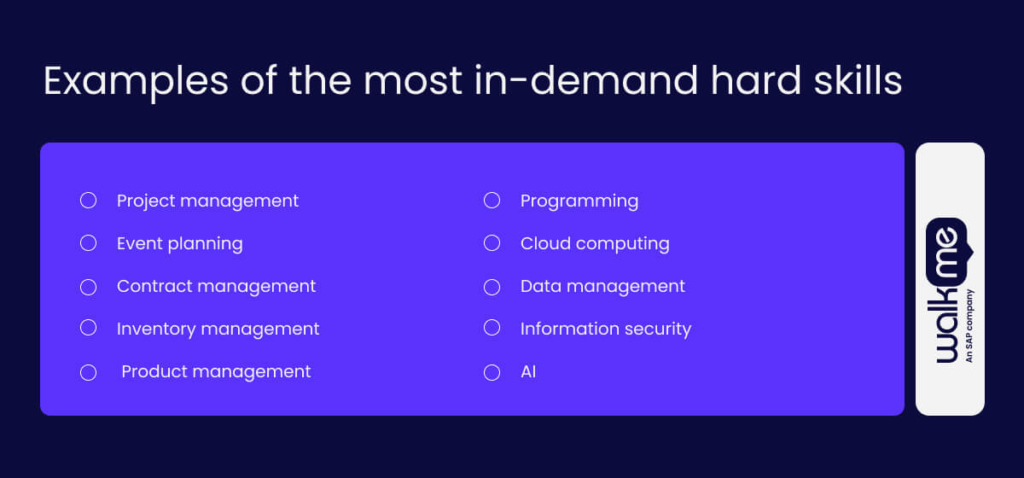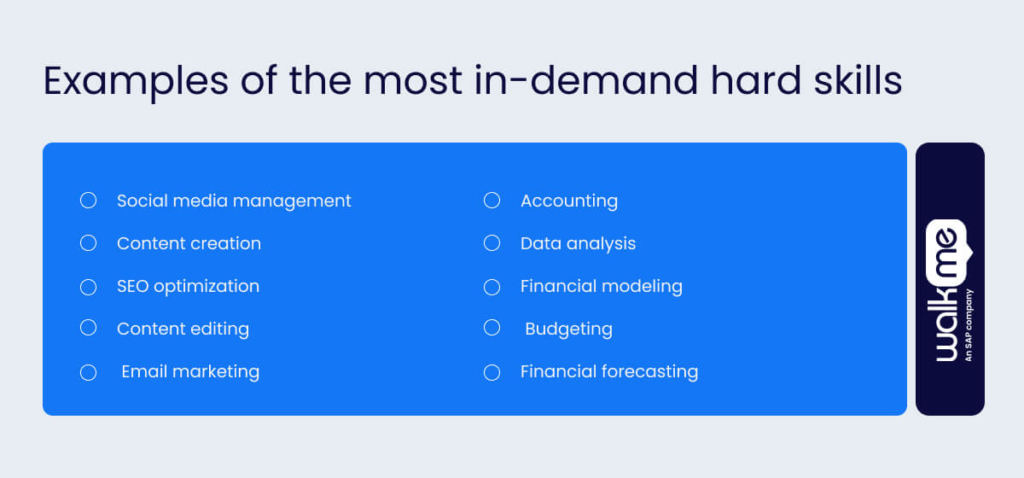Hard skills are specific abilities or knowledge that are measurable and gained through employee training or education. HR professionals can use these types of skills to show a candidate’s ability to perform job tasks and improve customer care.
This also helps employers assess if someone can do the job well. In the long-term, it can also improve adaptability in the workplace. In this guide, we’ll provide 20 examples of hard skills for each category to help you understand what to look for.

Business and management skills
The business and management hard skills that are common in most type of workplaces are:
1. Project management
Project management is about planning and completing a project to achieve a goal. Important skills include identifying and managing risks, controlling costs, using project tools like Gantt charts, ensuring quality, and using data to make informed decisions.
2. Event planning
Event management involves planning and coordinating events. Key skills include digital marketing. This helps promote events on social media and email. Online advertising is also important.
It helps create ads on Google and social media to attract attendees. Graphic design skills are useful for creating visuals like posters and banners. Effective contact management is crucial. It helps organize contacts like vendors, venues, and past attendees.
3. Contract management
Contract management oversees agreements, from creation to execution. It ensures compliance, financial value, and timely delivery.
Key skills include financial analysis, project management, legal and compliance knowledge, negotiation, and risk management. These skills help manage budgets, meet deadlines, ensure adherence to laws, and address potential contract issues effectively.
4. Inventory management
Inventory management is about tracking a business’s products. It helps ensure there are enough products to sell without having too many. Important skills include analyzing sales and stock levels, using inventory software, checking stock levels regularly, and working with suppliers to ensure smooth deliveries.
5. Product management
Product management guides a product’s journey from idea to launch and beyond. It ensures the product meets market needs and user expectations.
Key skills include market research to understand customers, trends, and competitors. Data analysis helps interpret metrics and user behavior. Roadmapping defines the product’s vision, priorities, and timeline.
Agile methodology ensures flexible and iterative development.
IT/technology
The various types of hard skills associated with IT/technology are:
6. Programming
Programming involves writing code to perform tasks. Key skills include data structures, debugging, and version control with tools like Git. Proficiency in languages like Python, Java, or JavaScript is essential.
Cloud computing supports online data storage, while web development uses HTML, CSS, and JavaScript. DevOps ensures efficient testing and deployment, and SQL is vital for database management.
7. Cloud computing
Cloud computing provides access to software, data, and tools online, replacing physical servers. Key skills include coding in Python, JavaScript, or R for application development.
Familiarity with platforms like AWS, GCP, and Azure helps choose the best fit for projects. Understanding cloud databases, such as NoSQL and relational databases, is also essential.
Linux skills and security knowledge, like access and identity management, are critical for protecting cloud data.
APIs like GraphQL and REST connect cloud services and enable data sharing. Basic DevOps knowledge helps streamline development and troubleshoot issues efficiently.
8. Data management
Data management is about organizing and using information. It involves finding patterns, understanding how data is stored, and planning how to use data. Data managers analyze data to find trends and solve problems. They know how to get data, write reports, and use tools like Excel. They also understand how databases work and make sure data is stored correctly.
9. Information security
Information security, or cybersecurity, protects sensitive data and systems from threats like unauthorized access or damage. It uses various measures to keep information safe.
Key skills in this field include network security, which involves managing controls to prevent unauthorized access, and risk management, which focuses on identifying and reducing potential threats.
Skills like using SIEM tools, computer forensics, and cryptography are also essential for effective security practices.
10. AI
AI, or Artificial Intelligence, creates computer systems that mimic human intelligence. These systems can learn, solve problems, and make decisions.
Key AI skills include programming skills in Python, R, and Java. Machine learning, which uses algorithms like decision trees and neural networks, is also important. Deep learning focuses on tasks like image recognition and language processing.
Marketing
Proficiency in marketing can lead to better customer experience and an improved ROI.

Examples of marketing hard skills are:
11. Social media management
Social media managers manage a company’s online presence. They create posts, talk to followers, and analyze numbers to see what works. To do this well, they need to be skilled at writing, design, data analysis, keyword and hashtag use, and different social media tools. They also need to know how to use popular social media platforms.
12. Content creation
Content creation is about making things like articles, videos, or podcasts for people to see. These are shared online to teach or entertain. To be good at content creation, you need to write clearly, research accurate information, edit for grammar and flow, use keywords to improve online visibility, design visually appealing graphics and videos, edit audio for podcasts, and analyze data to measure performance.
13. SEO optimization
SEO, or Search Engine Optimization, helps search engines understand a website’s content and match it with users’ searches. It ensures people find relevant and useful results.
Key SEO skills include keyword research and technical SEO, such as analyzing website structure. Link building and data analysis are also important. Basic HTML/CSS knowledge and expertise with SEO tools help optimize content.
Other skills include managing analytics and fixing technical problems like broken links or slow loading speeds.
14. Content editing
Content editing, or developmental editing, improves flow, readability, and clarity. It prepares content for publishing by ensuring it meets quality standards.
This includes matching the brand’s voice, checking accuracy, and applying on-page SEO. Key skills include fixing grammar, punctuation, and spelling. Editors also maintain style consistency and verify facts.
SEO skills are also needed to add keywords and optimize for search engines. Familiarity with CMS platforms like WordPress helps with publishing. Editors must adapt writing styles for different audiences and platforms.
15. Email marketing
Email marketing involves creating and analyzing campaigns to engage audiences and boost sales.
Key skills include data analysis to track results and spot trends. Copywriting is needed to create engaging content. List segmentation helps target specific groups effectively.
Marketers should know tools like Mailchimp or HubSpot. Design skills ensure emails look good. A/B testing improves performance by comparing elements. Automation skills streamline workflows. Basic HTML and CSS allow for custom designs.
Finance
Financial hard skills are abilities that help manage money, analyze data, and make smart financial decisions.
Examples include:
16. Accounting
Financial people, like accountants and bookkeepers, work with money. They use skills to keep track of money and make sure it’s used correctly. These skills include using software like QuickBooks, knowing about business rules and systems, and understanding how to use tools to analyze financial data. They also need to know about rules for recognizing income, managing risk, and following international financial standards.
17. Data analysis
Data analysis is about using numbers to find information. It’s a useful skill in many jobs, especially in finance. Companies like people who can find ways to save money and make things work better.
To do data analysis, you need to be good at finding information, presenting it clearly, and managing resources. You also need to know how to work with databases, make decisions based on data, and create reports.
18. Financial modeling
Financial modeling is about using numbers to predict a company’s future. It helps people decide if a company is a good investment or how much it’s worth. To do this, people use spreadsheets and math to make predictions about the future based on what happened in the past. They need to know how to use spreadsheets, understand accounting, and be able to analyze financial information.
19. Budgeting
Budget management is about using money wisely. It helps businesses grow and stay healthy. People who manage budgets need to be good with numbers, understand financial data, and be able to communicate well. They also need to be good at problem-solving and thinking critically.
20. Financial forecasting
Financial forecasting is about using past data to predict what will happen in the future. Businesses use it to set goals, plan for the future, and make sure they have enough money. It helps with things like creating business plans, borrowing money, and selling parts of the business.
Understand the various hard skills you need to create more effective employees
Hard skills are technical abilities that help employees do their job well. Employers want to hire people with the right hard skills to improve their ROI.
To improve your employee’s hard skills, you can:
Offer training programs: Teach your employees new skills.
Provide mentorship: Have experienced workers help new ones.
Conduct performance reviews: Give feedback on how people are doing.
Create skill-based development plans: Set goals to learn new skills.
Encourage continuous learning: Support employees in taking courses and attending conferences.
FAQs
Three characteristics of hard skills are that they are technical in nature, are measurable, and can be learned through education and training.

